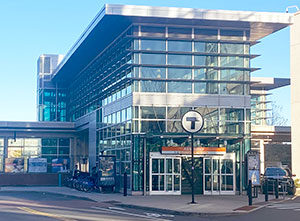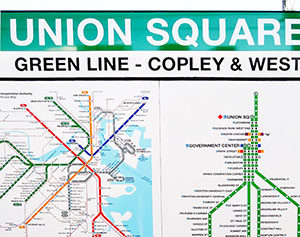
Orange Line to begin 30 day shut down as of August 19, 2022. — Photo by Bobbie Toner
Over the weekend, the MBTA released the Rider’s Guide to Planning Ahead as the T prepares for a 30-day full closure of the Orange Line from Oak Grove to Forest Hills stations beginning at 9:00 p.m. on Friday, August 19, and the 28-day closure of the Green Line from Union Square to Government Center stations beginning Monday, August 22.
The Rider’s Guide is a tool to provide riders with alternative travel options and information to inform travel decisions, including how the MBTA is ensuring accessibility during the shutdown, during this project.
The Orange Line closure will be used to address a maintenance backlog and planned construction investments, all of which are focused on safety improvements and returning the system to a state of good repair. Thirty days of 24-hour access will replace more than five years of Orange Line delays and weekend diversions.
The closure of the Green Line’s Union Square Branch will allow the T to perform final-phase construction work necessary to open the Medford Branch, which is now anticipated to open in late November 2022.
The T will post detailed diversion information throughout each of the 20 Orange Line stations that depict alternative travel options for riders that need to traverse the transit system during the closure.
Details on Alternative Service Options:
The MBTA encourages Orange Line riders to plan ahead and consider Commuter Rail service as an alternative to the Orange Line. Commuter Rail trains will make additional stops at Forest Hills, Ruggles, Back Bay, North Station, Malden Center, and Oak Grove stations to accommodate Orange Line passengers impacted by the bus diversion. Riders can simply show their CharlieCard or CharlieTicket to conductors to ride the Commuter Rail in Zones 1A, 1, and 2 on all Commuter Rail lines at no charge. The Hyde Park – Forest Hills – Ruggles – Back Bay – South Station and Oak Grove – Malden Center – North Station Commuter Rail schedules are both available on mbta.com.
During the Orange Line closure, the T will offer free shuttle buses between Oak Grove and Haymarket/Government Center and between Forest Hills and Back Bay/Copley.
 During the Green Line shutdown, riders traveling between Government Center and Union Square will board free and accessible shuttle buses, which will make stops at Lechmere station and the Lechmere station bus loop.
During the Green Line shutdown, riders traveling between Government Center and Union Square will board free and accessible shuttle buses, which will make stops at Lechmere station and the Lechmere station bus loop.
While all shuttle buses are fully ADA-accessible, accessible vans will also be available for any rider who prefers van service upon request. MBTA personnel will also be available at every station to assist riders in requesting this accessible van service. Due to the free shuttle bus service, RIDE trips that begin and end within ¾ mile of the Orange Line will be free for RIDE users during the 30-day shutdown.
Riders can use other existing MBTA bus and subway services to complete their trips, like the Route 39 bus, Silver Lines 4 and 5, the Green Line, and others. Riders are also encouraged to check out the MBTA’s Trip Planner.
The MBTA encourages those who can work from home to do so and for the public that needs to travel, to consider alternative travel options. The Orange Line closure will have regional impacts on the transportation network well beyond transit users.
Riders are also encouraged to monitor MBTA social media for the latest updates on Twitter, Facebook, Instagram, YouTube, and TikTok, to subscribe to T-Alerts at mbta.com, and visit more information at mbta.com/BBT2022.
Other Travel Impacts:
As of Monday, August 15, MassDOT’s Highway Division has advised that travelers of all modes throughout the Orange Line corridor will experience increased traffic congestion as a result of roadway modifications necessary to support the MBTA’s replacement bus shuttles. The modifications will occur at numerous points along the shuttle routes and range from reconfiguring travel and turning lanes, curb work, installation of designated bus lanes at various locations, and changes to traffic signal timing at multiple intersections.
Following the full Orange Line shutdown, regional traffic congestion is expected to increase substantially. At that time, all travelers across all modes are strongly encouraged to avoid driving through the area altogether, work from home if possible, consider rescheduling trips through the area that are not absolutely necessary, or for necessary travel, expect significant traffic congestion and travel delays.
More Information about the Work:
The major revitalization and safety work to take place on the Orange Line during this 30-day shutdown will deliver a number of projects, including track replacement, upgraded signal systems, and more, over five years faster than originally planned. The MBTA will also accomplish required track maintenance associated with Federal Transit Association (FTA) directives as quickly as possible.
This shutdown will maximize the amount of work able to be accomplished and will progress a number of projects and maintenance along the entire Orange Line, which will improve service, safety, and reliability for riders, including:
- The replacement of over 3,500 feet of 38-year-old Orange Line track and tie replacement work that will allow for the removal of speed restrictions, improving travel time for Orange Line riders.
- The replacement of two crossovers that facilitate the movement of Orange Line trains, allowing for improved reliability and future capacity improvements;
- Track repair, tie replacement, concrete work, and more along the Southwest Corridor of the Orange Line, which will improve reliability; and
- The installation of upgraded signals and associated systems at Oak Grove and Malden stations, allowing for improved safety and reliability.
The Orange Line provides approximately 101,000 trips each day with ridership approximately 49% of what it was prior to the pandemic.
For more information, visit mbta.com/BBT2022, www.mbta.com/RiderGuide, or connect with the T on Twitter @MBTA, Facebook /TheMBTA, or Instagram @theMBTA.
– Massachusetts Bay Transportation Authority















“Maintenance backlog” = decades upon decades of corruption, grift, and overt neglect coming to a head. And sadly, it is the taxpayers who ultimately bear the brunt of the nightmarish commutes and who will be footing the bill.